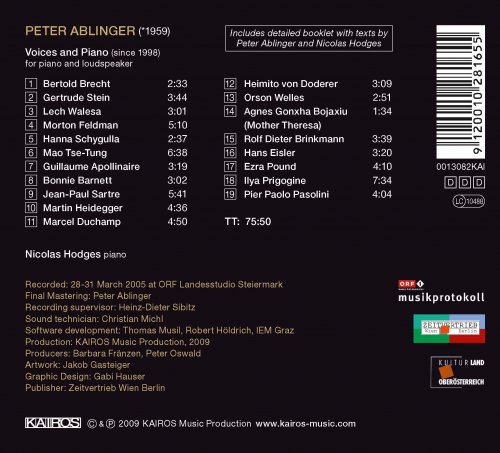
Nicolas Hodges - Peter Ablinger: Voices & Piano (2009/2020)
BAND/ARTIST: Nicolas Hodges
- Title: Peter Ablinger: Voices & Piano
- Year Of Release: 2009/2020
- Label: Kairos
- Genre: Classical
- Quality: FLAC (tracks+booklet)
- Total Time: 75:40 min
- Total Size: 290 MB
- WebSite: Album Preview

Tracklist:
01. Voices & Piano: No. 1, Bertolt Brecht
02. Voices & Piano: No. 2, Gertrude Stein
03. Voices & Piano: No. 3, Lech Walesa
04. Voices & Piano: No. 4, Morton Feldman
05. Voices & Piano: No. 5, Hanna Schygulla
06. Voices & Piano: No. 6, Mao Tse-tung
07. Voices & Piano: No. 7, Guillaume Apollinaire
08. Voices & Piano: No. 8, Bonnie Barnett
09. Voices & Piano: No. 9, Jean-Paul Sartre
10. Voices & Piano: No. 10, Martin Heidegger
11. Voices & Piano: No. 11, Marcel Duchamp
12. Voices & Piano: No. 12, Heimito von Doderer
13. Voices & Piano: No. 13, Orson Welles
14. Voices & Piano: No. 14, Anjezë Gonxhe Bojaxhiu (Mother Theresa)
15. Voices & Piano: No. 15, Rolf Dieter Brinkmann
16. Voices & Piano: No. 16, Hanns Eisler
17. Voices & Piano: No. 17, Ezra Pound
18. Voices & Piano: No. 18, Ilya Prigogine
19. Voices & Piano: No. 19, Pier Paolo Pasolini
Superficially, German composer Peter Ablinger's Voices and Piano bears some resemblance to Steve Reich's Different Trains. Both use recorded voices as their basis and add music that follows the contours of the speech. Unlike Reich, Ablinger does not develop the musical material to the point that it takes on a life of its own; the "accompaniment" is tied, sometimes note for note, to the spoken words, and rather than establishing a tonal center based on the inflections of the voice, it is relentlessly atonal, manically darting over the whole keyboard, often at the extremes of high and low. He uses brief audio clips, some by very famous personalities, and some by people whose voices he simply finds interesting. Ablinger's goal is to create about 80 portraits, but at the time of the recording, he had written 19, enough to fill a CD to its limit. A number of languages are represented -- English, by Bertolt Brecht, Gertrude Stein, Morton Feldman, Marcel Duchamp, and Orson Welles; Polish, by Lech Walesa; French, by Jean-Paul Sartre; German, by Martin Heidegger and Hanns Eisler; Chinese, by Mao Tse-Tung; and Italian, by Pier Paolo Pasolini, for example -- and the impact of each piece is undeniably related to being able to understand the language. When the meaning of the speech is clear, it's possible to hear the subtle ways in which Ablinger's music comments on it, but when it is not, the effect is so abstract that it's more difficult to find musical meaning in it. While there are indeed subtle differences between the musical treatments of the speeches, quite a lot of them sound so much alike in their dissonance and disjunction that there is a tendency to tune out the piano as obtrusive background noise and just listen to the voices. Several stand as especially insightful and musically intriguing because they comment on the voice and the meaning of the text rather than rigidly following its rhythms, particularly the movements devoted to Morton Feldman and Orson Welles. Mother Theresa is unique because more than half of the piece is for piano alone. Nicolas Hodges plays the treacherous piano part with confidence and sensitivity to the rhythmic flexibility of the voices. This is music that could reward close study, but it is not likely to appeal to the casual listener. The sound is mostly good, except that, inexplicably, some voices are so quiet that they can only be heard above the piano with difficulty.
Year 2020 | Classical | FLAC / APE
As a ISRA.CLOUD's PREMIUM member you will have the following benefits:
- Unlimited high speed downloads
- Download directly without waiting time
- Unlimited parallel downloads
- Support for download accelerators
- No advertising
- Resume broken downloads


